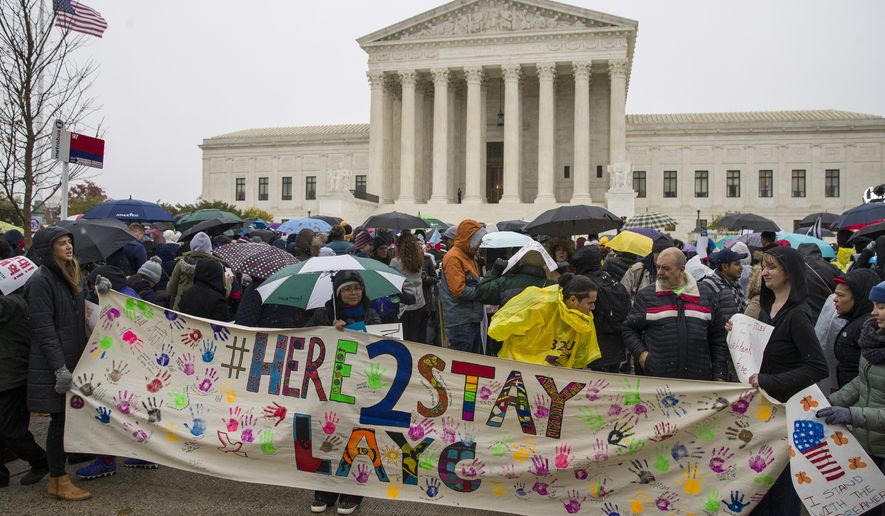There are teachers and lawyers, but tucked inside the DACA population are also thousands of accused drunken drivers and thieves, hundreds of forgers, sexual abusers and even 15 people charged with murder, according to updated government numbers released Saturday.
Sixty-two “Dreamers” were approved for Deferred Action for Childhood Arrival (DACA) despite having rape charges in their files, and two dozen had been accused of arson. Two with child pornography cases were given the OK, too, says U.S. Citizenship and Immigration Services.
Supporters often sell the Obama-era deportation amnesty as a reward for young illegal immigrants who have kept their noses clean, but the statistics show that 10% of those currently holding DACA status have criminal records.
“When DACA was sold to the American people as being for valedictorians and otherwise law-abiding, that’s really just not the case,” said one USCIS official. “There’s definitely criminal actors in the population that has received deportation protections.”
The agency released the data just days after the Supreme Court heard oral arguments on President Trump’s move to phase out DACA. The justices will decide whether the phaseout was legal.
As the court was preparing for arguments, Mr. Trump took to Twitter to complain about the program and raised the issue of DACA recipients’ criminal entanglements. He said many of them “are far from ’angels.’”
“Some are very tough, hardened criminals,” the president tweeted.
He cited a statistic from a previous USCIS report that said 53,792 DACA recipients had at least one criminal charge. The data released Saturday puts the total at 79,398 — including 67,861 who had charges on their records at the time they were approved and another 11,537 who were charged while they had DACA status but were allowed to remain in the program.
More than 4,300 had charges at the time they applied and racked up more charges while holding DACA status, according to the data.
Nearly 100 Dreamers were awarded DACA despite having 10 or more charges on their records.
Ken Cuccinelli, acting director of USCIS, which administers DACA, said the numbers were released to help the public better understand the controversial program.
“We hope this data provides a better sense of the reality of those granted the privilege of a temporary deferral of removal action and work authorization under DACA,” Mr. Cuccinelli said.
The new USCIS data refers to charges, not convictions. Cases may have been dropped, charges pleaded down to lower offenses or the migrants exonerated.
DACA grants a two-year stay of deportation along with work permits that enable the migrants to obtain driver’s licenses and Social Security numbers and access some taxpayer benefits.
More than 800,000 people have been approved over the seven-year program, and 660,000 are still protected.
Most are productive with their lives, according to research by Tom K. Wong at the University of California, San Diego. He regularly surveys DACA recipients, and his most recent report found 96% are in school or holding a job — including the majority who said DACA helped them get better-paying positions.
Mr. Wong also found 14% of DACA recipients purchased homes after getting the tentative status.
Those kinds of successes have made the program popular among most Americans, the majority of whom view Dreamers as sympathetic figures in the immigration debate, having generally been brought to the U.S. as children with little say in the decision and have grown up knowing only the U.S. for most of their lives.
Having a criminal entanglement is not an automatic bar to DACA, though felony convictions, major misdemeanors or a series of smaller misdemeanor convictions were supposed to be disqualifications. Minor traffic offenses don’t count against DACA applicants.
Originally, having suspected gang ties was not considered a bar, though the Obama administration updated that policy after several high-profile DACA-related gang crimes hit the newspapers.
An infamous case involved a man accused of a quadruple murder in North Carolina. One of the victims was a contestant on “America’s Next Top Model.” The Obama administration acknowledged that the immigrant had appeared in a database of those with suspected gang ties but was approved for DACA nonetheless.
Last year, authorities charged a DACA recipient with trying to kill a sheriff’s deputy in a shootout caught on video by a bystander.
Meanwhile, The Washington Times has tracked arrests of people granted DACA status who ended up getting charged with migrant smuggling at the border. At least 16 cases have been identified over the past 18 months.
DACA is a discretionary program, meaning USCIS officers could reject applicants for any reason they deem worthy.
But the data shows those denials were not a matter of course when it came to criminal records.
Of 8,669 DACA applicants who had drunken-driving arrests, nearly half were still approved for the program. More than 60% of those with fraud charges got the OK.
Rates were far lower for major crimes such as murder, where just 15 out of 65 people with charges on their records were approved. Child pornography and street gang charges were more serious disqualifiers, with just 15% of the former and 14% of the latter winning approval.
Overall, more than 70% of Dreamers with criminal records who applied for DACA were approved.
USCIS compiled the data using the IDENT database, which is the Homeland Security Department’s record of criminal arrests and border apprehensions.
• Stephen Dinan can be reached at sdinan@washingtontimes.com.




Please read our comment policy before commenting.